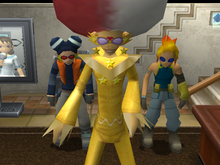|
Nintendo recently announced the next main-series Pokemon game, and once again I find myself entirely unexcited. There was a time not all that many years ago when a new Pokemon title was cause for intense speculation and excitement, but my reaction to the announcement of the eighth generation of the games was one of general dismissal. Part of this, of course, is age -- I'm sure there's a group of (mostly very young) people who are thrilled at the prospect of another Pokemon game -- but the more significant issue is that Pokemon has grown exceptionally stagnant. The new games will add a few more Pokemon to collect and will produce a new set of areas to explore, but if the past several generations of games are anything to go by, the overall formula will be almost entirely unchanged. You will play as a new Pokemon trainer setting out alone on an adventure, you'll battle with a rival a few times, you'll run up against a flat antagonist and his nameless lackeys, you'll complete a set of formulaic challenges, and then you'll face off against the champions of the new region. There will be a a forest or two, and an ice area, and a desert, and a few caves, and maybe a volcano. There may be a flashy new mechanic that shakes up the competitive scene a little but doesn't impact ordinary players much. And if you've played the earlier games it will feel like the exact same thing with a slightly different coat of paint. There's something to be said for sticking with a formula that works. The brand power of Pokemon is such that so long as its developers don't seriously mess up, the games will continue to sell well (and even strange design choices like those of Let's Go are unlikely to do much damage to the brand). Pokemon is a true cash cow, and all Nintendo and Game Freak need to do to profit from it is to milk it. There's nothing inherently wrong with that. My problem is the Pokemon games have become so formulaic as to be boring. It first hit me while playing through Pokemon Black 2 -- the sense that I'd done this all before, and that there was nothing new to experience. I haven't been able to finish a main series Pokemon game since, and not for lack of trying. For every person who leaves the series out of boredom there are likely two entering for the first time, so, again, there's not much motivation to change things up, but as someone who actually cares about game design it's rather painful to watch. The most recent games, especially, feel lacking in identity. If asked what fundamental things separate the sixth and seventh generations of Pokemon from the earlier ones, I'd struggle to come up with anything meaningful, and I'd probably have to settle for something like "X and Y have a pretty big world map" and "Sun and Moon replaced gyms with a nearly-identical functional equivalent." These are superficial differences and not enough to make the games feel like anything more than an obligatory continuation of the franchise. Nintendo has shown some willingness to experiment in recent years. Look at the hugely successful The Legend of Zelda: Breath of the Wild for an example of this. The Zelda games also tend to be formulaic (though not so much so as Pokemon), and Breath of the Wild completely broke with tradition, mostly to good effect. If Pokemon wants to recapture the attention of those who have lost interest, it needs to exhibit a similar level of creativity. Thing is, it wouldn't even be that hard, and Pokemon has actually done it before. Look at 2003's Pokemon Colosseum for an example of this. Colosseum was released during Pokemon's third generation, as a semi-spin-off for consoles. It plays just like the main Pokemon games, but (on top of being 3D, which was unusual at the time) its aesthetics and structure are completely different from the main games. And it's awesome. Colosseum is a rare example of an established series trying to make a "darker and edgier" game and managing to pull it off in a way that both works well and keeps the general feel of its source series. Instead of the typical "youngster on a journey" setup, Colosseum casts the player as an ex-criminal whose had a change of heart and wants to set things right. The game opens with the protagonist setting off a bomb in the criminal organization's base, stealing their secret weapon (a device that allows trainers to steal Pokemon), and riding off through the desert on a motorcycle, eventually stopping at a small bar on the outskirts of the nearest town. You know right from the get-go that this isn't your ordinary Pokemon game. To complete the image, your Pokemon start out at about level 20 (rather than the usual 5), which establishes that the protagonist is somewhat experienced. The first main story beat involves foiling a kidnapping. The antagonists are suspect researchers and corrupt politicians and two-faced stars and a ridiculously tall dancer with a fabulous afro. They're memorable, and it actually makes sense for the protagonist to be the one taking them down. Colosseum doesn't get bogged down in the details of its storytelling -- it's still gameplay-focused, as Pokemon always is -- but it has a sense of personality and style that's exceptionally rare for the franchise and nearly nonexistent in recent years. Additionally, the game breaks the typical Pokemon structure, removing gyms altogether (except for one that's present for world-building reasons) and replacing them with longform dungeons capped with boss fights. Many of the areas are connected in surprising and interesting ways, and each one has a clear purpose and identity. You go to each location with a specific and unique goal, which makes the dungeons themselves far more interesting than the traveling-for-the-sake-of-traveling locales of the traditional Pokemon games. Colosseum is also notable for defaulting to double battles instead of single battles -- which is to say, you and your opponent each have two Pokemon out at once instead of one. This exponentially increases your strategic options in a given turn and allows both players and enemies to use interesting strategies not possible in typical playthroughs of the main games.
All of this is hugely unusual for Pokemon, but it's actually not unusual for gaming in general. All Colosseum really did was take several cues from more standard JRPGs and apply a Pokemon flavor to them. It wouldn't be hard for Pokemon to do this again, and the change in structure would also likely necessitate a redefining and clarification of Pokemon's identity. Do I expect Game Freak to actually do this? Absolutely not. Would it make the series as a whole better? For sure. It feels to me like Pokemon has exhausted its toolbox of new and interesting ideas. It exists in a vacuum chamber of its own creation, trapped by its own uniqueness. It needs to not be afraid of drawing on other games for influence and ideas. Pokemon was not at all the first series to use the monster-catching-and-raising concept -- the Megami Tensei franchise predates it by more than a decade, and it's possible there are even older examples (though I don't know of any offhand) -- and Pokemon's original developers almost certainly looked to outside influences for early ideas. If Pokemon is to once more become a legitimately great series -- not just a set of scheduled, obligatory, formulaic, incremental releases -- it needs to allow its overall identity to weaken and to take in outside ideas. Somewhat paradoxically, this would allow the individual games in the franchise to establish stronger identities, developing unique personalities that aren't stifled by the Pokemon formula. There's a risk, of course, that experimentation could go wrong and produce a failure, but I'd rather Game Freak take risks and occasionally mess one up than play everything safe and settle for repetitive mediocrity. Leave a Reply. |
Isaiah Hastings
A Japanese Lit major and aspiring game designer with a passion for storytelling and music composition Archives
August 2019
Categories |
Proudly powered by Weebly


 RSS Feed
RSS Feed